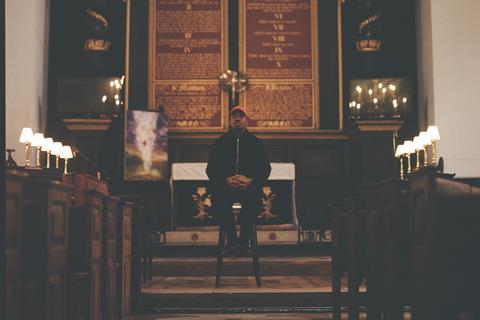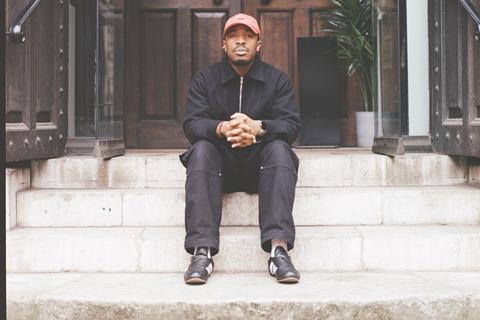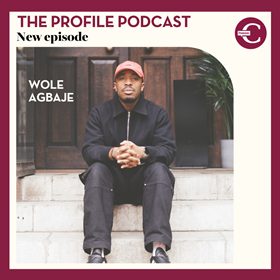The Pentecostal who was dragged kicking and screaming into the Church of England is now leading one of its most vibrant congregations
Thirty-year-old Wole Agbaje has packed more into the last decade than many manage in a lifetime.
An economics graduate, gospel music artist and founder of clothing brand Churchboy, he was only 22 when he started his first church, Imprint Leicester.
Two years later, he started his second congregation in central London. He’d been warned the financial district was “the graveyard of church planters”, but call it the optimism of youth, or just confidence in what God had called him to do, he did it anyway, taking on the church once led by ex-slave trader and hymnist, John Newton. Its history made the move feel particularly redemptive, Wole says, and today Imprint London is a thriving, diverse congregation. Surrounded by office blocks, it may not look like your typical parish. But then again, Wole is not your typical vicar.
He came “literally screaming” into the Anglican Church, he says, roaring with laughter. As a young Black Nigerian who grew up in a Pentecostal church, Wole was convinced that God could not – would not – be calling him to the Church of England. He wouldn’t be welcome in the CofE, he thought, with its lack of diversity and creativity. Besides, he had his heart set on a lucrative career in another financial district – New York. But there is only so long you can ignore God’s voice. Especially when it comes in recurring dreams, night after night. Eventually, he gave in.
Much of Wole’s ministry is based on a deep conviction that prayer is central. Throughout his childhood, his parents woke him every weekday at 6am to pray – and even if he squeezed his eyes shut and pretended to be asleep, there was no escaping it: “They would just carry me to family prayers!” he laughs.
But the experience was deeply shaping. His first congregation in Leicester saw enormous growth – mainly through the team praying for people and the resulting personal testimonies, he says. “One person would come, God would dramatically meet with them and then next week they brought five or six friends.”
I respected the Church of England, but I didn’t know if I would be welcomed by the Church of England
By the time of the Asbury outpouring in 2023 Wole was in London. He began to meet with two other church leaders in the city to contend for an outpouring of their own among the next generation. Soon, bi-monthly all-night prayer gatherings were being held, with stories of young Londoners queueing round the block to join in.
If it seems unbelievable that thousands of young people would not only want to pray through the night but queue up to get into a church to do so, you’d better believe it. God is on the move, says Wole, and they won’t stop praying for more.
You grew up in a very strong, Christian home. How did you find it when you left for the first time and went to university?
The summer before university, I remember thinking: OK, I’m a church boy. So I can do what many church kids do: go to university and reinvent myself. I was tempted by that thought. Then I heard the Lord say to me: “Wole, will you trust me with your years at university? Would you give them to me?” I said: “OK, God, I’m gonna give three years of my university experience to you. I’m gonna follow you with all my heart and let’s see what happens.”
In my second year, I had a dream of a gospel showcase that told the story of Jesus through music, dance performances and different visual elements. And at the end, I saw an evangelistic talk, with worship and prayer ministry. It wasn’t my plan to formulate a musical, but I had this exact dream for seven nights, back-to-back.

Wow! That’s amazing! Did you hear from God often in dreams?
I wasn’t a dreamer at all. And it was only on the seventh night that I realised: Maybe God is trying to speak to me. I knelt down and I was like: “God, are you trying to speak to me?” I heard the Lord’s voice say: “It’s me. It’s called Imprint and it’s a movement that brings my prodigals back to me.”
On the day of the event, we had just finished the sound check when one of my friends said: “Wole, we need to open the doors now! The lines are crazy!” I thought he was joking, but outside there were lines [of people] all around the building. I was so shocked. Four hundred students came. Hundreds of students were crying and repenting of their sins. It was like the fear of God filled that place – and it happened so spontaneously. I remember thinking: What on earth is happening?
There’s been lots written about a revival among Gen Z in recent months, but ten years ago, the climate was arguably very different. Do you think God was giving you a foretaste of what was to come?
Yeah, I think so. I had never seen young adults impacted like that. The Christian community grew overnight. But I never thought it would launch me into ministry. If anything, I was trying to repel it. I was an economics major and I was like: I’m meant to be in New York, making lots of money.
I doubt the Church of England salary scale was quite what you were aiming for when you chose economics!
[Laughs] Yeah, it’s very humbling!
So how did you end up leading a church?
Because of what happened with the showcase, I guess there was an expectation that I was gonna do more events or student ministry. But I was like: This is not really my vibe. I did this event because God gave me a dream, but it was a one-time thing.
Then, I had another dream. The Lord said to me: “Go to Holy Trinity Church Leicester.” I woke up, typed it into Google, and saw that it was an Anglican church. I literally gasped. I was like: “God, why do you want to send me to an Anglican church? You know what the Church of England is like!” I was going to a Pentecostal church, and I guess, stereotypically, the Church of England – especially then – was known for being very traditional, not very diverse. I was like: I don’t think I would even be welcomed in this denomination, especially because of its history.
But I skateboarded to the church. The worship was incredible. The prayer ministry was so powerful. I remember thinking: This is the opposite of what I thought an Anglican church would be. So I kept on going back.
One week, I heard the Lord say: “This is home”, and I knew that the Lord was calling me to be an Anglican priest. I was like: This church is cool, but there’s no way I’m going to be a vicar. I started naming different denominations that the Lord could send me to, but he just kept on saying: “This is home, this is home.” I was literally on the floor crying with bitterness! I remember screaming: “I’m a 20-year-old that’s just been called to be an Anglican priest. You’re ruining my life!”
Then, to my horror, the church leaders said: “We feel we’re meant to offer you the internship programme after you graduate.” I said: “Oh, thank you, but no. I’m going to move to New York and make lots of money – for the kingdom, hallelujah!”
But the Lord gave me maybe 25 dreams about this internship programme. It got to the point where I knew if I didn’t do it, I would just be disobedient. I had to be willing to trust the Lord knew best, even if it wasn’t what I wanted. So, after much resistance, I decided to do the internship programme. And I loved it!
Prayer is powerful. So, let’s just take a risk and pray for people
During that year, I had dreams about being a young church leader. I didn’t tell anyone because I thought if I didn’t say anything, it would never happen. So that was my plan: Don’t tell a soul about the dreams and then, after the internship programme, even though it’s been good, quickly move to New York. But one day, my vicar called me into his office and said: “Wole, I feel the Lord has asked us to support you in starting your own church.”
I’m usually quite a reverent person, but I just started screaming: “Are you crazy? You ask a 21-year-old to start a church? Have you lost it?” He said: “I know it sounds crazy. But has God spoken to you?” As he asked me that question, all of my dreams came back to me. I started freaking out. I was like: Is this some kind of divine conspiracy? I don’t want to enter ministry. How on earth have I moved from studying economics with a dream to move to the US to being in Leicester and leading an Anglican church?
I love the way you tell it so honestly and hilariously. But being serious for a second, it sounds as if it was quite painful to lay down all your plans for the future…
Absolutely. I couldn’t deny that God called me to start a church. What I wrestled with was: God, why are you calling me, of all people? I thought: First of all, I’m a young, single guy. I haven’t yet found my wife and, especially growing up in the Pentecostal stream, I rarely saw leaders leading by themselves. Then in the Church of England, I didn’t see much diversity, so I was like: As a young, Black Nigerian guy, is there really a space for me? And my theology is very charismatic, so I wondered if that would be welcome. I’m also a creative. I know these might sound like massive generalisations. I respected the Church of England but I didn’t know if I would be embraced and welcomed by the Church of England. So, yeah, it was horrifying to me!
Does leading as a single person make a difference to your ministry? Is it harder by yourself, or does it have advantages?
I would love a family of my own one day but, being single, you can radically pour your heart out in service to God and to other people. You don’t have a divided heart; you don’t have this covenant responsibility to put someone first above all things. When I do have a family of my own, I’m going to be forever grateful for these years.
Tell us about how you went from Leicester to London.
So at 22, I had a church in Leicester [Imprint] that was, to my surprise, going really well. We started in the basement of a pub – it was all that we could afford – with six people.
We’d gather together as a team and ask the Lord: “What do you want to do in this gathering? Who are the people you want to minister to?” We’d just share those words in the service and invite people for prayer. People started getting healed, set free, encountering God in amazing ways. And that’s how the church grew.
I was walking one day and [I heard] a young girl telling her friends: “Oh my gosh, I went to this place called Imprint last night. I’ve never encountered God like that in my life!” It reminded me of the Samaritan women who, after meeting Jesus, ran into town and said: “Come and meet a man who told me everything I ever did” (John 4:29, TLB). One person would come, God would meet with them and the next week, they brought five or six friends. I was surprised. But also: prayer works. Prayer is powerful. So, let’s just take a risk and pray for people.
Eight months into our journey, we started getting prophetic words about planting in London. It seemed so far-fetched. A student in my small group came to me and said: “Wole, I couldn’t focus in my lectures today, because the Lord kept showing me visions of us planting a church into London.” She had no idea what we were trying to discern as a team.

You’re now based in a very historic church with a very special history. What does that mean to you personally?
When we were first offered to plant into this parish, I didn’t know the history [of St Mary Woolnorth]. Then, when I got to know the story, I was like: “God, this is bonkers! I’m just in awe!”
I couldn’t deny that God called me to start a church. What I wrestled with was: God, why are you calling me, of all people?
My predecessor was a man called John Newton, who led my parish church in the 18th century. He’s famous for writing ‘Amazing Grace’ and was a slave trader who became a priest. He wanted everyone to know how the Lord can save even “a wretch like me”, as he says in the hymn. But what I love so much about Newton’s legacy is that during his time as a priest in my parish church, he mentored a young politician called William Wilberforce, who successfully campaigned for the abolition of slavery.
As a Black man, to now be priest of that parish is such a privilege. For us to have such a diverse community in that parish feels so redemptive. The Lord was already writing a story, and now a bunch of kids get to be a part of that!
What’s it like to lead a church in the heart of the city?
When people first heard that I felt God was calling me to plant a church in the City of London, so many respectable leaders told me: “That’s crazy. It’s not residential.” As one clergyman told me: “The City of London is the graveyard of church plants.”
But the Lord knew there were people hungry and desperate for him here. Because of the hours people work, all of our small groups are in the city. I remember a lawyer walking in and, when she saw everyone, she just started crying. She said: “I am just so grateful that you guys planted a church here. I spend six days of my week here. My home is like a hotel room. I’m barely there. But it’s so great to be a part of a Christian community in the place where I work and socialise. I can finally really have my faith strengthened in that same place.” That perfectly summarises the opportunity we have.
Historically, we’ve perhaps looked at the parish model as where people live, and this being what makes a church community. But if you work in a big city, sometimes you spend far more time at work than at home…
Especially if you’re a lawyer! I think our perspective of community has radically shifted. It’s not just where we live. Nowadays it’s where we work, where our local gym is. It’s why running clubs are so popular…
Your church has a running club, doesn’t it?
[Laughs] Yes! It’s called Bully the Roads, and they definitely bully the roads!
Rev Al Gordon, who leads SAINT Church in Hackney, has previously written for Premier Christianity about visiting Asbury during the 2023 outpouring and how it changed his church. Imprint has been hosting prayer gatherings with SAINT, as well as Kings Cross Church (KXC). Tell us about those.
I would be considered a millennial and, again, not to generalise, but millennials – even in the Christian space – have historically been quite tribalistic. It’s like: This is my church. God moves here. Gen Z are not trying to subscribe to a church or a movement, they’re trying to subscribe to Jesus. And that is so beautiful.
Asbury showed us that it’s not just about one movement. It’s not about one celebrity worship leader or speaker. It’s about Jesus alone. Imprint, SAINT and KXC are all geographically close. We reach roughly the same demographic. We’re all Anglicans. So, we could have been seen as rivals, but the Lord just humbled all of that, and squeezed out all the subtle tribalism.
Gen Z are not trying to subscribe to a church or a movement, but to Jesus
Around [the time of] Asbury, all three of our churches were experiencing mini outpourings of our own. The Lord was moving, people were coming to faith, there were spontaneous confessions and people being set free – but we realised the Lord was calling us to come together, to pray for an awakening in the next generation.
There was no flashy branding – we just called it ‘Joint Prayer Gathering’. We didn’t really know what we were doing; we were just trying to step out in obedience. We only expected 100 people at most, but on that first night, we saw 500-600 people. We were shocked to see how many people powerfully experienced God, were released to be evangelists, set free from different things; it was so gorgeous. We’ve been doing these gatherings every other month for 18 months now, and at our last one, we had 2,000 people.
It’s not just down to us – there are many churches and movements all over London praying – but two years later, we’re just like: “God, you are doing something in this time.” The statistics are crazy. It jumped from 25 per cent of Gen Z believing there’s a God to over 50 per cent. It’s remarkable.
Do you feel we’re on the on the cusp of something?
Absolutely. I grew up in a context where the dominant culture was quite militant atheism. In secondary school, I was the only Christian. To say that you were a Christian, or even spiritual, was comical. But now, I rarely meet a young adult who would hold such a strong atheistic view. The majority of young adults will now call themselves spiritual.
It’s remarkable how the Lord has softened hearts and opened up minds. I think people have tried secularism, tried so many different worldviews, and found them void. Now, they’re exploring Christianity and Jesus is meeting people and saving lives.
To hear the full interview listen to Premier Christian Radio at 8pm on Saturday 14 June, or download ‘The Profile’ podcast premierchristianity.com/theprofile
All photos (c) Samuel J Butt







































No comments yet